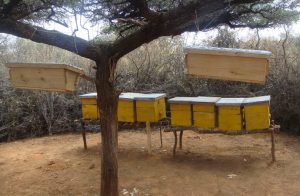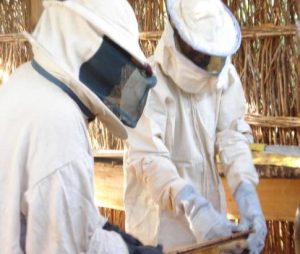Strengthening livelihood through beekeeping
Bakol region has two major livelihoods groups; the agro pastoral and pastorals. The agro pastorals in Bakol mainly keep cattle and camel and produce sorghum. The pastoral groups in the region are found in Elberde district and parts of Tieglow and Huddur districts. Pastoralists mainly keep camel, sheep and goat. The region is still recovering from several shocks of drought, conflict and market disruption over the recent years.
The conceptualization of this project is informed after visits made to the target area in Tieglow to do a fruits and vegetable evaluation for a project that ended in May 2007. The bee keepers in the area indicated the need to be supported in their beekeeping initiatives. A meeting was held with Tieglow District Agriculture officials in September 2007 and the need for support to improve beekeeping in the area was affirmed. Visits were done to Gorweyne beekeeping cooperative and talks held with the chairman and representatives of the cooperative.
No macro assessment specifically on beekeeping has been carried out by WVS in the district. However, statements on ground and secondary data used informs this proposal that Tieglow has the highest potential for bee keeping in South Somalia with 150 bee centers and individual villages having over 300 hives. This project intends to conduct a baseline survey at the project onset, whose details will better inform the redesign of the project.
All interventions will be extensively discussed with the local administration and agreed (in writing) by the relevant authority in order to facilitate smooth operations with the community. Moreover, WVS presence in the region dates back to 2002 and the relationship with the community has been instrumental in establishing the needs and potential.
Tieglow was selected because the organization has had good relations with the communities over the years. Secondly there is an already existing beekeepers cooperative and existing structure that can be used. The climate of the district was also an important factor to consider as it has a high potential area for beekeeping. There is an abundance of flowering plants providing nectar and pollen throughout the year. As well the great variety of nectar sources available to the bees gives the honey produced from this area an interesting and variable flavor
Although beekeeping can only rarely become the sole source of income and livelihood for communities in Tieglow, its role as sources of supplementary earnings, food, and
- Project Title : Strengthening livelihood through beekeeping
- Client : Bay & Bakool Beekeepers
- Date : 20 May 2007
- Project Value : $2,5500
- Category : Honey Production and Apiary Capacity building
- Duration : 2 Years
- Status : Completed

Bee suits
The distribution of the bee suits were the most requirements for the farmers after the hives the suit is the protective for the bee sting which is the danger to the people especially the harvesting time, the project distributes the above estimation number which the graph will shown you.
This increases the confidence of the farmers especially the once which a fried the sting of the bees, so the lesson learned while the project is going the harvesting time always happens in night period because of the afraid of the bee sting.
Beekeepers practicing the bee suites after them doing practical harvesting in Tieglow demonstration a apiary out skirt of the district

The graph bellow will shown you the project period distribution plan
Improved beekeeping equipments distributed to the target groups which is 15 main villages, the number distributed also in between the graph.
This table bellow shown the distributed equipments for the project period to the targeted villages
| KTBH | LANGSTROTH | SMOKER | BEE SUITS | RAIN BOOTS | BICYCLES |
| 120 | 320 | 195 | 195 | 60 | 15 |
Project face out
After December 31st which is the period of the project face out, WVS will then be left with a role of supervision and monitoring. During this time, it expected this will be continuing the Tieglow Beekeeping Consortium (TBC)This will have matured in stewardship (accountability in expenditures, plans in place for long-term sustainability of beekeeping work, working committees in environmental conservation and others that will be created are active and trained).
